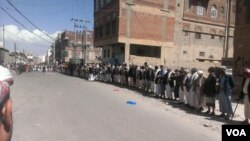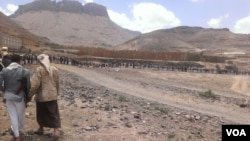Yemen is embroiled in an impossible civil war, with foreign countries supporting competing governments and airstrikes raining down nearly every day.
Without a functioning central government, Yemen’s tribal system is, in some ways, running the country. But rights groups say this ancient system is also fueling the war and leaving the country unprepared to handle the current humanitarian crisis.
“When people feel that the state is unable to protect people’s rights and property, of course they will look to their tribes for leadership,” said Hassan Mohsen, 42, a tribesman in the Khawlan village, to the east of the Yemeni capital.
Tribal leaders are local rulers that often have more say in the everyday lives of average people than government officials. Tribal leaders are able to maintain this power in part because they are often themselves government representatives and/or religious leaders.
“The tribal system has been politicized and the tribes no longer cooperate with each other,” said Abdulbasit Al-Mashwali, a leader of the Yemeni Parliamentarians Union, a government watchdog group in Sana’a. “In the past they filled a humanitarian role, but not anymore. Now it's all political bickering.”
Unofficial system
The tribal system was officially abandoned with the overthrow of the Imamate in 1962, but the governments that followed kept it in place unofficially, according to Abdulrahman al-Marwani, who heads the Dar Al-Salam, a human rights advocacy group in Sana'a.
“For half a century governments have been handing over the nation’s wealth to the tribal leaders,” he said. “And the tribal leaders also get money from foreign sources to pressure the state’s political decisions.”
Despite rampant corruption, tribesmen are generally fiercely loyal to their leaders, making it worthwhile for governments to pay tribal leaders to ensure popular support. But this loyalty also makes people vulnerable to manipulation, al-Marwani said. “Some of the tribal leaders try to keep their communities ignorant to rule them and use them as they like,” al-Marwani explained.
As a result, tribal leaders have recruited fighters for whichever side they support in the current civil war, thereby deepening the conflict. The security crisis is also becoming more complicated because the recruits are ultimately loyal to the tribal leaders, not the side they join.
And the current war is not that different from the war of 1962, according to Hussein Nasser, 78, a tribesman and soldier who fought in that earlier civil conflict.
“Many of the tribal leaders fought with their tribes, not because they favored one side or the other,” he said, "but because they received money or gold.”
Humanitarian crisis
Decades of support for tribal leaders has also left Yemen unprepared to handle the humanitarian crisis, with a few aid organizations struggling to provide basic services.
According to U.N. Special Envoy Ismail Ould Cheikh Ahmed, most Yemenis are in need of emergency aid, and at least half a million children are suffering from malnutrition. Yemen is “bleeding and its cities [are] collapsing,” he said.
Untangling the tribal system before stabilizing the country would not necessarily improve the humanitarian situation in the short run, because it would cause further disarray, according to Hamoud al-Awodi, a sociology professor at Sana’a University. “The tribesmen do not realize the benefits from the state.”
Religious manipulation
Besides having the ear of the people, tribal leaders often also have access to strategic areas, like ports or oil fields, and are the Yemenis best able to raise a group of armed men, said the Dar Al-Salam's al-Marwani.
And armed groups in Yemen are increasingly affiliated with religious parties rather than political parties, he said. Warring religious groups, al-Marwani added, also contribute to the expansion of extremist groups by polarizing all sides.
At his home in Sana’a last week, Khalid Hassan, a 41-year-old tribesman, chewed qat leaves with his friends, a traditional afternoon pastime in Yemen. One of the reasons the Arab Spring went wrong in Yemen, he said, is because tribal leaders raised militias, turning protests into battles.
They “recruited people from the tribes surrounding Sana’a,” he said. “And they started attacking army brigades, security buildings and governmental institutions.”






